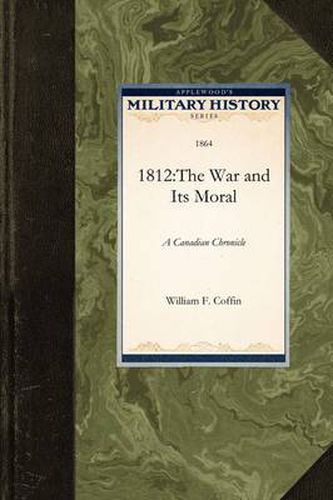Readings Newsletter
Become a Readings Member to make your shopping experience even easier.
Sign in or sign up for free!
You’re not far away from qualifying for FREE standard shipping within Australia
You’ve qualified for FREE standard shipping within Australia
The cart is loading…






Purchase of this book includes free trial access to www.million-books.com where you can read more than a million books for free. This is an OCR edition with typos. Excerpt from book: CHAPTER III. State of Canada at the outbreak of the war. Military force?Attitude of the people. Ayatar of Brock?His character and early career?Letter from Montreal, 1808?Takes command of troops in Upper Canada, 1810?Becomes Lieutenant-Governor, 1811. Hull invades Canada, 12th July. Proclamation?Brock’s reply?Meets Parliament. Spirit of the country. United Empire Loyalists. Proctor at Amherstburg, 4th August?Detaches Tecumseh?Defeats Van Horne. On 7th August, Hull retires from Canada. Affair at Magagua. Capture of Miohilimacinac, by Capt. Roberts and Toussaint Pothier. Brock with York Volunteers reaches Amherstburg. Interview with Tecumseh. Capture of Detroit, 16th August, 1812. At the outbreak of the war, Canada was in fact in a defenceless condition. To man the fortresses of Quebec and Kingston, and to cover a frontier of 1,700 miles in length, the whole available force consisted of 4,450 regulars of all arms. In the Upper Province, which presents a water frontier of 1,300 miles, there were but 1,450 soldiers, or about two men and a fraction per mile, without counting garrisons. Sir George Prevost, whose qualifications partook more of a civil than of a military character, governed the country, and commanded in chief. The militia consisted of about 2,000 men in the Lower Province, and perhaps 1,800 in the Upper, not all called out, unarmed and undisciplined, and possessing little of the appearance or of the quality of soldiers, except pluck. It may well be imagined, and admitted without disparagement to any, that, in the absence of all fitting preparation, the tocsin of war bore upon its echoes dismay to many hearts. The preparations of the enemy had been long made and ostentatiously paraded. Doubtless their extent had been exaggerated, but still they wereimmeasurably in …
$9.00 standard shipping within Australia
FREE standard shipping within Australia for orders over $100.00
Express & International shipping calculated at checkout
Purchase of this book includes free trial access to www.million-books.com where you can read more than a million books for free. This is an OCR edition with typos. Excerpt from book: CHAPTER III. State of Canada at the outbreak of the war. Military force?Attitude of the people. Ayatar of Brock?His character and early career?Letter from Montreal, 1808?Takes command of troops in Upper Canada, 1810?Becomes Lieutenant-Governor, 1811. Hull invades Canada, 12th July. Proclamation?Brock’s reply?Meets Parliament. Spirit of the country. United Empire Loyalists. Proctor at Amherstburg, 4th August?Detaches Tecumseh?Defeats Van Horne. On 7th August, Hull retires from Canada. Affair at Magagua. Capture of Miohilimacinac, by Capt. Roberts and Toussaint Pothier. Brock with York Volunteers reaches Amherstburg. Interview with Tecumseh. Capture of Detroit, 16th August, 1812. At the outbreak of the war, Canada was in fact in a defenceless condition. To man the fortresses of Quebec and Kingston, and to cover a frontier of 1,700 miles in length, the whole available force consisted of 4,450 regulars of all arms. In the Upper Province, which presents a water frontier of 1,300 miles, there were but 1,450 soldiers, or about two men and a fraction per mile, without counting garrisons. Sir George Prevost, whose qualifications partook more of a civil than of a military character, governed the country, and commanded in chief. The militia consisted of about 2,000 men in the Lower Province, and perhaps 1,800 in the Upper, not all called out, unarmed and undisciplined, and possessing little of the appearance or of the quality of soldiers, except pluck. It may well be imagined, and admitted without disparagement to any, that, in the absence of all fitting preparation, the tocsin of war bore upon its echoes dismay to many hearts. The preparations of the enemy had been long made and ostentatiously paraded. Doubtless their extent had been exaggerated, but still they wereimmeasurably in …